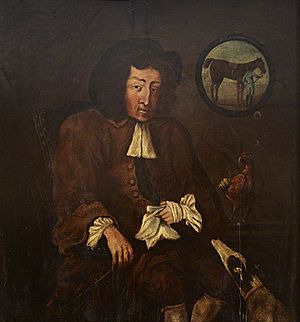Tregonwell Frampton facts for kids
Tregonwell Frampton (born in 1641, died March 12, 1727) was a famous English racehorse trainer. Many people called him 'the father of the turf,' which means he was very important in the early history of horse racing.

Contents
His Life Story
Tregonwell Frampton was born in 1641 in a place called Moreton, Dorset. He was the fifth son in his family. His father, William Frampton, was the lord of the Moreton manor.
When he was young, around 1670, Tregonwell was known for his love of hawking, which is hunting with trained birds like falcons. He was also very interested in horse racing. He often went to race meetings and owned horses that he trained. He had a house in Newmarket, a famous horse racing town.
At Newmarket, he became the "keeper of the running horses" for several kings and queens. These included King William III, Queen Anne, King George I, and King George II. This meant he was in charge of the royal racehorses.
A Smart Gambler
Tregonwell Frampton became well-known at Newmarket for being good at betting on horse races. In 1675, a report mentioned that he bet a large amount of money, £900, on a horse race. He won that bet!
His name often appeared in racing records as a winner. He would bet much larger amounts than most people at the time. For example, in April 1676, he had two big races in one week. One was at Newmarket and the other at Salisbury, and each race was for £1,000.
One famous story about Frampton involves a horse named Dragon. Dragon was a very fast horse belonging to the king. In 1682, Dragon raced against a smaller horse called Post Boy and lost. Even after this, Dragon remained a famous racehorse and continued to compete in important matches.
The Merlin Match
One of the most famous races Frampton was involved in was against a horse called Old Merlin, owned by Sir William Strickland. Frampton tried to test his horse against Merlin in secret before the main race. He added extra weight to his own horse during this test, hoping to make it seem slower than it was. However, Merlin also had extra weight, and Frampton's horse still lost the test.
When the real race happened, Frampton's horse was beaten again by Merlin. This race was very important because people saw it as a competition between the north and south of England. Many people bet huge amounts of money on the outcome. Because so much money was lost, a new law was made. This law said that people could not legally get back any money owed from bets over £10.
Frampton himself lost a lot of money in this race. He later gave his family's estate to his cousin Giles Frampton for £5,000. This happened sometime before 1702.
Royal Horse Trainer
Around 1695, Frampton officially became the "keeper of the running horses" for the royal family. This important job was even written on his tombstone. He worked for King William III, Queen Anne, King George I, and King George II.
In October 1695, he won a race at Newmarket with the king's horse. Records show he was paid for setting up the royal racehorse stables. By 1700, he was receiving £1,000 each year. This money was for taking care of ten racehorses, including paying for ten boys to help, and buying food like hay, oats, and bread for the horses. He continued to receive a salary, which was about £100 for each horse he trained, until he died.
He trained the royal horses and arranged their races. Often, these horses would race under his name. Besides training royal horses, he also bred his own horses. He would sometimes sell them for high prices.
When he wasn't working with horses, Frampton enjoyed other activities. He liked hawking, hare coursing (hunting hares with dogs), and watching rooster competitions. He was very good with his roosters. King William III, when visiting Newmarket, would often spend afternoons watching Frampton's roosters compete.
His Death
Tregonwell Frampton kept his job as royal horse trainer until the day he died, which was March 12, 1727. He was buried in the church of All Saints in Newmarket. There is a special monument there to remember him.
His Reputation
Tregonwell Frampton is still remembered today as 'the father of the turf.' This title shows how important he was to horse racing in England. His portrait was often used in books about racing, showing his lasting fame in the sport.
 | Roy Wilkins |
 | John Lewis |
 | Linda Carol Brown |

